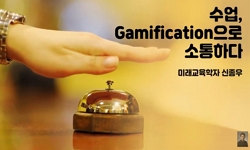게이미피케이션은 게임의 작동기제가 제공하는 흥미적 요소들을 통해 사용자의 자발적 참여 동기와 몰입을 유도할 수 있는 잠재가치가 상당한 바, 게임 산업뿐만 삶의 다양한 분야에 적용...
http://chineseinput.net/에서 pinyin(병음)방식으로 중국어를 변환할 수 있습니다.
변환된 중국어를 복사하여 사용하시면 됩니다.
- 中文 을 입력하시려면 zhongwen을 입력하시고 space를누르시면됩니다.
- 北京 을 입력하시려면 beijing을 입력하시고 space를 누르시면 됩니다.

A Comparative Study on the Differences in Cultural Attributes of Gamification between Korea and Austria
한글로보기https://www.riss.kr/link?id=A105159008
- 저자
- 발행기관
- 학술지명
- 권호사항
-
발행연도
2018
-
작성언어
English
-
주제어
게이미피케이션 ; 게임요소 ; 재미 ; 몰입 ; 문화적 차이 ; Gamification ; Game Elements ; Fun ; Flow ; Cultural Differences
-
등재정보
KCI등재
-
자료형태
학술저널
-
수록면
109-122(14쪽)
-
KCI 피인용횟수
1
- 제공처
-
0
상세조회 -
0
다운로드
부가정보
국문 초록 (Abstract)
게이미피케이션은 게임의 작동기제가 제공하는 흥미적 요소들을 통해 사용자의 자발적 참여 동기와 몰입을 유도할 수 있는 잠재가치가 상당한 바, 게임 산업뿐만 삶의 다양한 분야에 적용될 수 있는 기법으로 주목 받고 있다. 이전의 연구들은 게임요소와 몰입 또는 재미요소와 몰입간의 관계를 살펴보는 등 부분적 시각에 국한되어왔다. 이에 반해 본 연구는 게임요소와 재미 그리고 몰입으로 이어지는 일련의 과정 속에서 게임요소를 정의하고 재미를 정서적 재미, 인지적 재미, 그리고 사회적 재미로 구분하여 어떤 게임요소가 어떤 유형의 재미에 더 유의한 영향을 주는지 알아보고자 하였다. 특히 게임은 ’재미’를 위한 것이며, ‘재미’는 문화적 요소와 관계가 있는 일종의 정서라는 점에 착안하여 본 연구가 출발하였다는 점에서 기존연구와 근본적 차이를 갖는다. 문화적 배경의 차이에 따라 느끼는 재미가 다를 것이며 그 재미에 영향을 미치는 게임요소도 다르게 나타날 것이라는 가설을 검증하고자 한국과 오스트리아를 대상으로 게임요소와 재미 그리고 몰입에 대한 상관관계의 차이를 알아보았다. 그 결과, 한국은 사회적 재미가 몰입에 영향을 주는 것으로 나타났으며 사회적 재미에 영향을 주는 게임요소로는 ‘관계’와 ‘보상’으로 나타났다. 한편, 오스트리아는 인지적 재미가 몰입에 영향을 주는 것으로 나타났으며 인지적 재미에 영향을 주는 게임요소는 ‘스토리’와 ‘보상’으로 나타났다.
다국어 초록 (Multilingual Abstract)
Gamification is receiving much attention from a variety of fields of life as it has tremendous potential to help people get experienced with ‘fun’ by the elements of game mechanism and thus attract their voluntary participation eventually to reach...
Gamification is receiving much attention from a variety of fields of life as it has tremendous potential to help people get experienced with ‘fun’ by the elements of game mechanism and thus attract their voluntary participation eventually to reach the state of ‘flow’. Some studies examined this process with a focus the relationship between game elements and flow while others regarded the game elements as fun elements and discussed the relationship between fun and flow. However, starting from the fact that the fundamental reason humans play a game is for fun and fun is in turn induced through game elements, our study defines fun as an emotion and uses it as factors are also introduced as control variables for the study on the belief that game elements affecting fun will apparently vary depending on the cultural dimensions. This study confirms that difference exists in correlations between game element, fun, and flow, depending on the different cultural settings. By comparing samples from Korea and Austria, each representing the east and the west respectively, it was found that ‘social fun’ affects flow and both ‘relationship’ and ‘reward’ are in turn affecting social fun in case of Korea. On the other hand, Austrian case reveals that cognitive fun affects flow and game elements affecting cognitive fun are ‘story’ and ‘reward’.
목차 (Table of Contents)
- 요약
- Abstract
- 1. Introduction
- 2. Literature Review
- 3. Research Design and Hypotheses
- 요약
- Abstract
- 1. Introduction
- 2. Literature Review
- 3. Research Design and Hypotheses
- 4. Data Analysis and Results
- 5. Conclusion
- References
참고문헌 (Reference)
1 성백순, "재미요소가 몰입과 만족에 미치는 영향" (사)한국컴퓨터게임학회 25 (25): 139-147, 2012
2 정희영, "유아용 게임 어플리케이션의 재미요소 분석" 한국유아교육학회 33 (33): 237-262, 2013
3 Choi. D., "Why People Continue to Play Online Games: In Search of Critical Design Factors to Increase Customer Loyalty to Online Contents" 7 (7): 11-24, 2004
4 Malone, T. W., "Toward a Theory of Intrinsically Motivating Instruction" 5 (5): 333-369, 1981
5 Park, S. J., "The Study of the Interrelations between Game Components and Flow" 4 (4): 819-823, 2006
6 Kim, J. W., "The Relationship of Gema Elements, Fun, and Flow" 8 (8): 405-411, 2015
7 Kintsch, W., "Text Comprehension, Memory, and Learning" 49 : 294-303, 1994
8 Hoffman, Donna L., "Marketing in Hypermedia Computer- mediated Environment: Conceptual Foundations" 60 : 50-68, 1996
9 Hunicke, R., "MDA: A Formal Approach to Game Design and Game Research" 4 (4): 1722-, 2004
10 Deterding, S., "Gamification: Using Game Design Elements in Non- gaming Contexts"
1 성백순, "재미요소가 몰입과 만족에 미치는 영향" (사)한국컴퓨터게임학회 25 (25): 139-147, 2012
2 정희영, "유아용 게임 어플리케이션의 재미요소 분석" 한국유아교육학회 33 (33): 237-262, 2013
3 Choi. D., "Why People Continue to Play Online Games: In Search of Critical Design Factors to Increase Customer Loyalty to Online Contents" 7 (7): 11-24, 2004
4 Malone, T. W., "Toward a Theory of Intrinsically Motivating Instruction" 5 (5): 333-369, 1981
5 Park, S. J., "The Study of the Interrelations between Game Components and Flow" 4 (4): 819-823, 2006
6 Kim, J. W., "The Relationship of Gema Elements, Fun, and Flow" 8 (8): 405-411, 2015
7 Kintsch, W., "Text Comprehension, Memory, and Learning" 49 : 294-303, 1994
8 Hoffman, Donna L., "Marketing in Hypermedia Computer- mediated Environment: Conceptual Foundations" 60 : 50-68, 1996
9 Hunicke, R., "MDA: A Formal Approach to Game Design and Game Research" 4 (4): 1722-, 2004
10 Deterding, S., "Gamification: Using Game Design Elements in Non- gaming Contexts"
11 Zichermann G., "Gamification by Design: Implementing Game Mechanics in Web and Mobile Apps" O'Reilly Media, Inc. 2011
12 Bunchball Inc., "Gamification 101: An Introduction to the Use of Game Dynamics to Influence Behavior" 2010
13 Csikszentmihalyi, M., "Flow: The Psych- ology of Optimal Experience" Harper Collins 2004
14 Trevino, L. K., "Flow in Computer-mediated Communication: E-Mail and Voice Mail Evaluation and Impacts" 19 (19): 539-573, 1992
15 Fornell, C., "Evaluating Structural Equation Models with Unobservable Variables and Measurement Error" 18 (18): 39-50, 1981
16 Jegers, K., "Elaborating Eight Elements of Fun: Supporting Design of Pervasive Player Enjoyment" 7 (7): 2009
17 Hamari, J., "Does Gamification Work? -A Literature Review of Empirical Studies on Gamification" 3025-3034, 2014
18 Hofstede, G., "Culture's Consequences: Comparing Values, Behaviors, Institutions, and Organizations across Nations" SAGE Publications 2001
19 Hall, E. T., "Beyond Culture" Anchor Books 101-102, 1989
20 Huizinga, J., "A Study of the Play-Element in Culture" Routledge & Kegan Paul 2011
21 KOCCA, "2015 Contents White Paper" Korea Creative Contents Agency 2015
22 Clarke, S. G., "'Flow' Experience in the Daily Lives of Sixth from College Students" 85 (85): 511-523, 1994
동일학술지(권/호) 다른 논문
-
서비스기업의 변화준비성을 통한 행동유도시스템 활용이 접점직원의 민첩성 및 성과에 미치는 영향
- 한국산업정보학회
- 정현석(Joung Hyun Suk)
- 2018
- KCI등재
-
- 한국산업정보학회
- 권혁기(Kwon Hyeok Gi)
- 2018
- KCI등재
-
- 한국산업정보학회
- 김근홍(Kim Kun Hong)
- 2018
- KCI등재
-
- 한국산업정보학회
- 권재득(Kwon Jaedeuk)
- 2018
- KCI등재
분석정보
인용정보 인용지수 설명보기
학술지 이력
| 연월일 | 이력구분 | 이력상세 | 등재구분 |
|---|---|---|---|
| 2026 | 평가예정 | 재인증평가 신청대상 (재인증) | |
| 2020-01-01 | 평가 | 등재학술지 유지 (재인증) |  |
| 2017-01-01 | 평가 | 등재학술지 유지 (계속평가) |  |
| 2013-01-01 | 평가 | 등재학술지 유지 (등재유지) |  |
| 2010-01-01 | 평가 | 등재학술지 선정 (등재후보2차) |  |
| 2009-01-01 | 평가 | 등재후보 1차 PASS (등재후보1차) |  |
| 2008-01-01 | 평가 | 신청제한 (등재후보1차) | |
| 2007-01-01 | 평가 | 등재후보학술지 유지 (등재후보1차) |  |
| 2005-01-01 | 평가 | 등재후보학술지 선정 (신규평가) |  |
학술지 인용정보
| 기준연도 | WOS-KCI 통합IF(2년) | KCIF(2년) | KCIF(3년) |
|---|---|---|---|
| 2016 | 0.57 | 0.57 | 0.58 |
| KCIF(4년) | KCIF(5년) | 중심성지수(3년) | 즉시성지수 |
| 0.6 | 0.6 | 0.796 | 0.32 |





 DBpia
DBpia






